When I was a kid (like a kid kid, under the age of ten), I had a very specific pet peeve regarding the entertainment that I consumed. It centered around the inevitable bashing of any character who showed an inclination toward logic, pragmatism, and worry. My thirst for adventure—oddly—developed gradually, over time. As a very small human, I had an overly-developed sense of caution about the world, and so I was drawn to characters who looked before leaping, who made plans, who considered dangers.
What I’m trying to say is, I hated Disney’s The Jungle Book because no one listened to Bagheera.
I loved worriers and voices-of-reason as a kid. When I was five, C-3PO was the best part of Star Wars. It caused me acute physical distress to watch Pinocchio ignore the words of Jiminy Cricket. My favorite character in Mighty Morphin’ Power Rangers was Alpha 5, Zordon’s assistant robot who watched in constant terror as the Power Rangers got their butts kicked, his sandwich cookie head wobbling whenever something went wrong. Alice in Wonderland used to upset me because I hated how everyone snapped at (or tried to murder) Alice for attempting to make sense of her illogical surroundings and not knowing the rules. These were the folks who comforted me—they did what I would do in their given situations. I was too young to understand that these were generally not the characters who moved a story, who made things happen. Even if I had known, it’s doubtful that I would have cared much. Six-year-olds generally don’t.
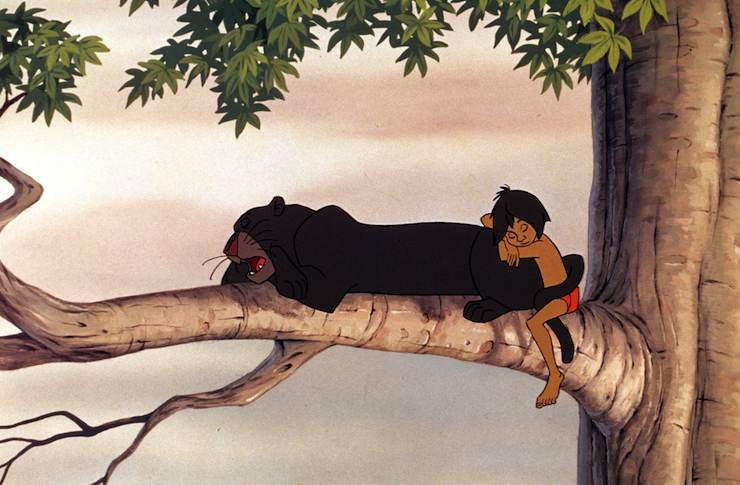
For me, The Jungle Book was one of the greatest offenders of this set. It began with a wonderfully pragmatic, caring guide for Mowgli, then proceeded to make him look like a grumpy, boring drip to the audience. Baloo was the cool one. Baloo had the cool song, and a cool voice, and he let Mowgli do whatever he wanted. That’s what kids want, right? Of course they do. They want to hang out with someone who will gladly give them cake for breakfast. Who will let them stay up as late as they want. Who will throw the rulebook into the river and watch it float away while they eat their weight in sweet berries and burp the alphabet.
Except I liked doing things by the book. As a kid, I was an awful teacher’s pet. To this day, I still break out in a cold sweat if someone asks me to blatantly break a rule. No idea where it comes from, genetics-wise—my parents are both musicians. They certainly didn’t play by rules. Maybe my engineer grandpa? It doesn’t matter, the point is, Baloo was the enemy to my mind. Baloo was chaos, Baloo was time wasted, Baloo probably got you to try drugs for the first time and I had already been taught to SAY NO.
Yeah, I was kind of an intense child, I guess.
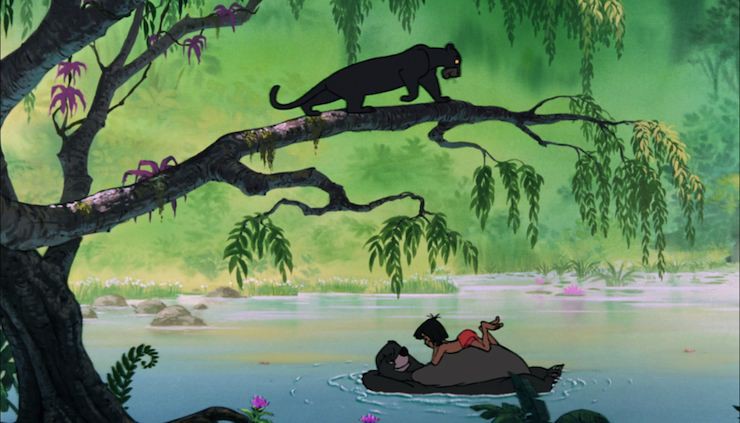
There are plenty of movies with characters like Bagheera, who fulfill the same function and foil within the narrative. But The Jungle Book goes a step farther than usual by painting him in a supremely unflattering light. This is because they use the character as a deliberate roadblock to everything fun that would happen in the film. Kids want Mowgli to stay in the jungle, they want to watch him try to be an elephant for a day, they want him to stop Shere Khan. Bagheera wants him to do the smart thing, and get out of mortal danger by living with his own kind. But if Mowgli did that, there would be no movie, so the two have a fight and Bagheera throws his paws in the air and is done with it. Then Mowgli meets Baloo, the cool guy, who agrees to keeps him around with the added benefit of no structure ever and infinite beach volleyball days.
There’s also a bit where Baloo pulls on Bagheera’s tail while the panther is sitting comfortably in a tree, and it makes me want to drop a rock on that carefree dude every time I see it. The action reads to me like nails on a chalkboard, but for eyes. Squeaky eyeball pain.
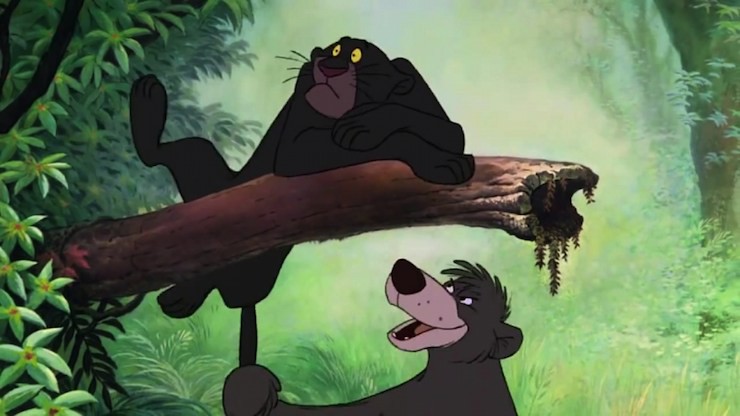
Then Mowgli gets kidnapped by monkeys, and Bagheera—who only pretended to be done with this whole circus because he cares—and Baloo rescue the kid. Bagheera finally explains who is after Mowgli, and tells Baloo that he has to convince the man-cub to go live with people. So Baloo tries, and Mowgli runs away from him, and because this eventually leads the kid right into Shere Khan’s clutches, it makes the very practical panther appear more at fault than anyone. If he hadn’t spoiled Baloo’s forever party, maybe it all would have turned out fine.
All Bagheera is really guilty of is making smart choices to keep the boy safe. But in the world of beloved fictional characters, the majority of the population aren’t going to cuddle the stuffed animal of a character who makes reliable decisions. They’re going to cuddle the one that says things like, “Let me tell you something, little britches,” and “He’s had a big day. It was a real sockeroo.” Baloo gets all the glory by getting swatted down by Shere Khan before the big dust up, and once the tiger’s run off, Bagheera goes to the trouble of eulogizing the guy while Mowgli stands by sniffling, but the point is that Baloo is funny, so he listens to Bagheera go on about how great he is before jumping up and shouting PSYCH I AM SO NOT DEAD. Because it’s hilarious to let people think they’ve lost you, and get them to mourn over your live body, all so you can pop up with a one-liner. That’s what cool guys do. They also give you incredibly original nicknames like “Baggy,” wait—what is actually going on here, why do people like this?
And then the reprise of “Bare Necessities” at the end of the film has Bagheera joining in, as though the movie is now reassuring the audience—it’s okay, the panther’s cool now, too! He gets it!
Bagheera doesn’t need to get it. He is perfectly lovely just as he is.
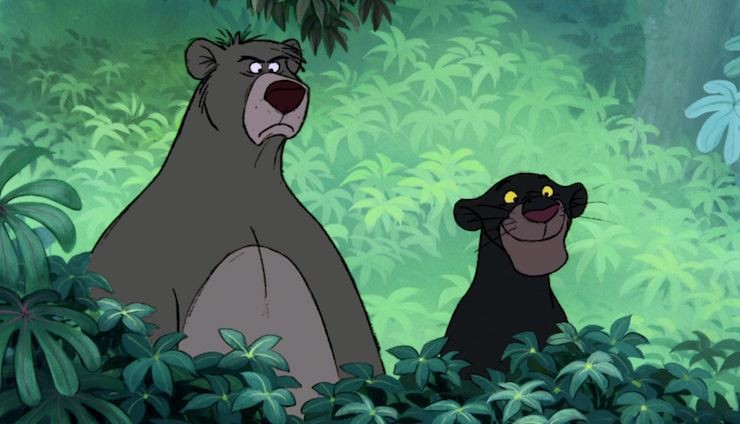
I just never really understood what the movie was trying to convey to me. And it didn’t help that the whole thing did eventually end with Mowgli going to the Man-Village after dispatching Shere Kahn. Like… the point is Bagheera was right, but too much of a stick-in-the-mud to for anyone to take him seriously? Is that the actual moral of the story? That’s a terrible moral. It’s not even a moral, really, it’s just the plot resolving awkwardly as a ten-year-old boy decides to change his entire outlook on existence because he saw a girl for the very first time. It’s an ending that no rational human being can buy unless we actively engage with the idea that Mowgli has somehow figured out human social constructs in the space of thirty seconds, and is aware that this girl is someone he might want to get it on with in several years. It’s not “just a crush” when you decide to abandon the only life you understand for a song about water-carrying, is what I’m saying.
Because of my natural aversion, I was determined to steer clear of the live-action Jungle Book rendition, despite the fact that I liked all the actors involved and typically enjoy Jon Favreau as a director. Then a bunch of friends whose opinions I respect seemed to like it, so I took a chance. I was holding my breath against the expected two-ish hours of semi-aggravated boredom, when something magical happened. Bagheera was… awesome. He was a complete character beyond narrative function, whose cautiousness was not depicted as lamentable, whose concern for Mowgli was out of sheer love, who was never treated like a wet blanket or a stuffy control freak. He was the Bagheera I’d been shouting about since childhood, the one who took it upon himself to care for a infant human boy because he was noble and majestic, dammit, and everyone in the jungle knew it.
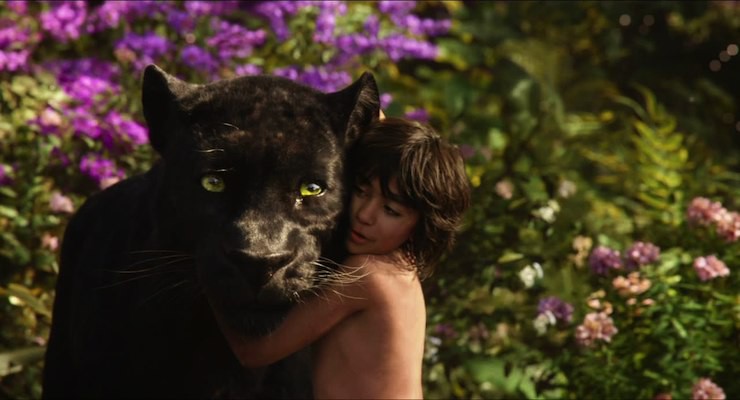
Perhaps storytelling simply outgrew the trends that made the Jungle Book cartoon so difficult for me to watch as a little one. Maybe we’ve moved beyond the idea that being dependable and sensible are “boring” or “uninteresting” attributes, and realized that children can handle more complex characterizations. It does seem to be the trend for these live-action Disney revamps, and while they’re not particularly risky offerings, they can be more engaging than their predecessors in more ways than one.
All I know is, in the new film, Baloo tells Bagheera that Mowgli is a special kid, and when the panther replies “I know—I raised him,” I was all thanks movie, gonna cry now, and I didn’t even want to like you.
The film did me the extra favor of not showing good old Baloo in a favorable light the whole way through either—we get to see his selfish side, and his fear, and his excessive laziness isn’t depicted as a positive. He has his own journey to make, and he comes out better for it. He and Bagheera arrive at a mutual respect in their efforts to protect the kid. In fact, with their strengths combined, Bagheera and Baloo make excellent co-parents to Mowgli. Yes, I am advocating gay cross-species jungle dads. It’s a great idea. Way better than that Talespin cartoon.
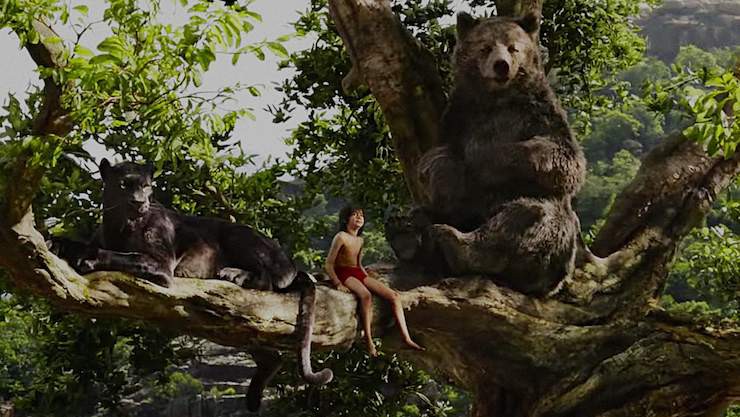
There’s nothing quite like having six-year-old you vindicated. While I did eventually come to love characters who moved and shook and committed great acts, I will always have the deepest of soft spots for those pragmatic warriors, the angels on our shoulders. Because being that good usually doesn’t win you any prizes, and it never wins you as many accolades as the cool guy. But the Bagheeras of the world always mattered to me. I always saw them, heeded them, clung to every considered word.
The little worriers of the world need heroes, too. And sometimes those heroes are busy telling you the twenty-one ways you might die today, urging you to retreat when you want to press on. It may not make much sense to the rest, but that solid dose of truth can be far more comforting than a rousing speech or a smooth song any day of the week.
An earlier version of this article was published in April 2016.
Emmet Asher-Perrin thinks this probably explains a lot of why they loved Spock, too. You can bug them on Twitter and Tumblr, and read more of their work here and elsewhere.










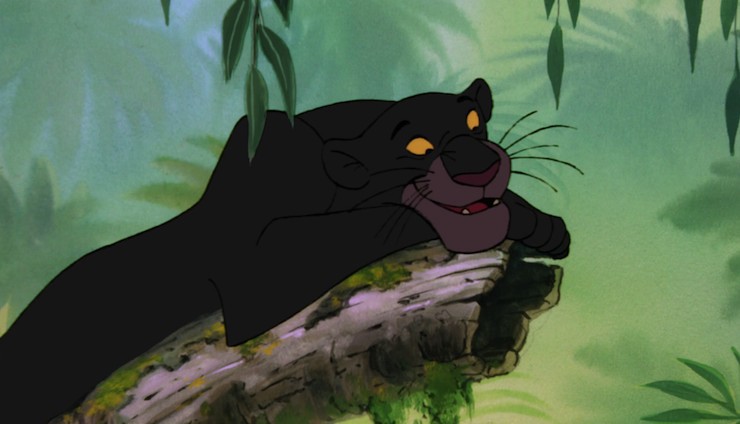
Maybe that’s why I enjoy Neil Gaiman’s Graveyard Book so much- he doesn’t have a Baloo character.
Emmet, you must be a huge fan of Michael Carpenter from The Dresden Files too if this is your thing. As someone who typically gravitates to the opposite end of the spectrum narratively for characters that can best be characterized as “Fun Time Devil May Care Charlies” (no joke, I had a professor in college reference several characters in that archetype that way and it has stuck) I do have a tendency to really appreciate the occasional pragmatic, uncool character. For whatever reason every now and then there is just one of those characters that I find myself really connecting with for no known reason and the best example I can think of is the aforementioned Michael.
In The Jungle Books, Bagheera is the coolest character. Except maybe for Kaa, and Kaa is an ectotherm and so has an advantage in this regard.
Nice piece, Emmet.
And the idea of Bagheera and Baloo as”gay cross-species jungle dads” is unexpected, and strange, and I absolutely ADORE it.
Maybe it’s because I grew up with the audio book of Kipling’s Jungle Book, not the Disney movie, but I always thought of Bagheera as EXTREMELY COOL.
Or maybe it’s just that I really wanted a panther.
Bagheera is your parents, the voice of reason and experience. Baloo is the cool uncle or the kid with the leather jacket and/or various piercings who leads you into temptation. Who are you going to listen to? And, more importantly, in the end who do you actually listen to?
We all have to learn from our mistakes, no matter how much voices of reason and experience say otherwise. How many kids, even after being told not to touch the hot stove, will still do so anyway? Bagheera is not cool, but in the end he is right.
@3, @5 You’re right about that. In the original stories, the roles are reversed. I’ve read that Kipling meant Baloo, who teaches the young jungle-dweller the “law of the jungle,” to be a caricature of a “munshi,” a pedantic Hindu tutor. Bagheera comes across more as a raffish, “cool” uncle, who periodically drops by to snark about all the “schoolroom” learning and how what Mowgli needs is real experience. In the stories, Bagheera’s “backstory” really matters: he was born in captivity in a king’s menagerie, until he awoke to his true nature and broke out of his cage and fled to the jungle. He knows what it’s like to be hemmed-in by rules without real knowledge of living in the world.
Ha you were me as a child! Cuz yeah, I hated Little John in the Jungle. Team Bagheera 4 LYFE
You’ve made me want to break my taboo against the live action offerings!
@6 – yes, I agree. The ending is kind of weird – even as a kid I found it peculiar – but it does prove Bagheera right. Also, I always felt that Baloo is the one who has to undergo a lot of much-needed character growth before the ending – he starts out professing his commitment to a life of pure hedonism and then gets a 24-hour crash course in responsibility, sacrifice and loving someone enough to put them first. Bagheera doesn’t have to travel so far because he was right all along. All he has to learn is that, hey, “Bare Necessities” is sort of catchy. And maybe that people you’ve dismissed as fundamentally unserious and frivolous can improve on acquaintance (speaking as someone who was an uncool, serious and judgemental kid and is now an uncool, serious but more open-minded adult, I don’t think that’s the worst lesson in the world).
Of course, all the above just applies to the Disney film, not the Kipling stories. I like both but they’re very different animals.
Really enjoyed this article. I was also a child who was the opposite of irreverent and generally a good decision-maker. I knew it, too, and kept at it steadily – which was an excellent way of not making friends. It’s probably a wonder to some of my former classmates that I didn’t end up a ridiculously uptight adult.
I can deeply relate to this, but the funny thing is that I’m probably less uptight/rigid as an adult than I was as a kid, heh.
On the one hand I really do like and sympathise with Bagheera – on the other hand I like dear old Baloo too! (-;
My mom’s nickname for me when I was a child was “worry-wart.” Small, serious, bookish and bespectacled. This essay hit me right where I live.
Oh my god, I LOVED Bagheera, too! He was always my favourite character in the movie, and I loved how right he was about everything. Thank you, thank you for writing this article!
I was also a rule-following kid and am still a rule-preferring adult. I remember taking the message from the animated Jungle Book to be that Bagheera may seem like a stick in the mud but he is right to be cautious.
In Winnie the Pooh and the Blustery Day, Rabbit is the rule-following one, running around trying to get everyone else in line. He’s the project manager nobody will listen to; he’s overly rigid but he’s right that organization is needed. He gets quoted fondly around our house “You’ve got to have a schedule!”
The neutral chaos, fun characters always get the attention, but I much prefer the sensible ones, too. I was born sensible. My two much older, idiotic brothers called me “Granny” which I took as a compliment. Sensible not only rules, it survives much longer.
You should have read the book and ditched the movie. Disney, especially of that era, jams everything into a formula. Boring. Offensive. In the books, Bagheera was very cool. In the books, Kaa was an ally and also cool. But as far as the Disney writers were concerned, snakes has to be bad guys.
I am so not a Disney fan
I’ll join the small, bespectacled, serious and intense crowd. My mother was very much a rule-follower (and rule-imposer), and even so she often told me, “you take everything too seriously!”
As an adult, I was able to explain a lot of the pattern by getting diagnosed with generalized anxiety disorder. Meds help.
As another person who read the book first and the movie a distant second, I find the entire concept of Bagheera as “uncool” mind-boggling. Bagheera is awesome. Did you know he has a bare patch under his chin from when he was kept in a cage? Until the day he remembered he was a panther and smashed his way out. Because he’s cool like that.
I am sorry that little Emmet didn’t find the books because I think the long poem “Law of the Jungle” would have been very appealing. Stanza after stanza of rules! And the wolf that shall break them must die!
Sweet thoughts :)
I still remember a storybook tale that was read to me as a kid, I think 4 or 5 y.o., and how much it bugged me: in it, two monkeys that wanted to depart to go having some adventures start preparing. The worrier monkey start thinking about all contingencies and start to load his backpack with stuff for all kind of eventualities, while the carefree monkey does nothing. The morning after, the worrier monkey have such a big backpack he can’t lift it so he can’t leave, while the carefree monkey takes up a rifle(!) and a sandwich (I still remember the book illustration) and promptly head out in search of adventures, telling the first monkey that eventually everything would work out itself.
It made me sooo angry! Ok, the first monkey did overdo the planning, but maybe a bit more of a compromise? And what with the rifle, did the second monkey look forward to simply steal whatever he may have needed later at gunpoint?
And the story did not address anyway what would have happened when some of the more than reasonable events the first monkey was worrying about would come to be.
As a baby Aspie I went in two directions. I preferred formal not-cool types: I’m still frequently blind to how social behaviour is sorted out non-verbally. So far, rather like you. I would watch the “cool kids” fight or wander off, and prefer to talk to the teacher, particularly the unpopular teacher.
In another variant, I’ve often preferred to read villains and anti-heroes and sidekicks and the odd characters that turn up in a story. The moment I’m aware the author is trying to cosy up to me and push the hero/s at me and say “look! Look here! This is what you’re supposed to be looking at! This is admirable!” I want to go somewhere else. Heroes are supposed to be so utterly sweet-cinnamon-roll that everyone has to love and admire them for their universal kindness. Or they’re supposed to be so incredibly brave likewise.
I love the obstreporous. The members of the Awkward Squad. The witty and sarcastic and not-at-all-admrable ones that get none of the authorial approval. They often seem to push themselves onto the page with most of the best lines, even though the author is telling you to look somewhere else.
But it’s the author telling you how to feel that’s the most irritating to me. Exactly the parts that the reader and the writer are meant to love tend to drop me.
A large part of this, as for you, was that children are expected to identify with and love anarchic figures and loud physical types of play. And making friends easily.